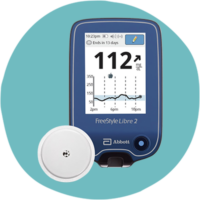As medical science advances, so does the ability to manage and treat diabetes. Older adults, who often face unique challenges in managing this condition, can benefit from new trends in diabetes management. Here, we explore some of the most promising trends and innovations in diabetes care today.
For more State of the Art and proven tips click >> Diabetes in Older Age Management Guide.
For diet tips click>> Healthy Eating for Diabetic in Old Age
Diabetes Management Though AI & Robotics

Artificial intelligence (AI) and robotics are revolutionizing healthcare, and diabetes management is no exception. These technologies are helping to make care more personalized, efficient, and effective. Here are few trends in diabetes management:
- Continuous Glucose Monitoring (CGM) Systems with AI: Devices like the Dexcom G6 and Freestyle Libre provide real-time blood sugar readings. AI algorithms analyze this data to predict blood sugar trends and offer actionable insights to users. Benefits for Older Adults: Reduced need for finger-prick testing and timely alerts for high or low blood sugar levels.
- Insulin Delivery Automation: Smart insulin pumps, often paired with CGMs, adjust insulin delivery automatically. Examples include Tandem’s t:slim X2 pump and Medtronic’s MiniMed 780G system. These devices mimic the pancreas’s function more closely than ever. How It Helps: Older adults who may forget doses or struggle with complex regimens benefit significantly from this automated approach.
- Robotic Assistance in Diabetes Care: Robotic devices can support individuals with limited mobility. For instance, robots equipped with AI can remind patients to take medications, perform light physical tasks, or monitor health conditions remotely.
- Robotic Innovations: Robotic companions like ElliQ encourage physical activity and social interaction, which indirectly supports better diabetes management.
New Trends in Diabetes Management: New Medications and Treatments
Recent developments in pharmaceuticals are providing better outcomes for people with diabetes, including:
- GLP-1 Receptor Agonists: Medications like Ozempic (semaglutide) and Trulicity (dulaglutide) not only lower blood sugar but also support weight loss, reducing the risk of cardiovascular complications.
- Popularity Among Seniors: Once-weekly doses and fewer side effects make these drugs particularly appealing to older adults. Click to know >> Are Ozempic and Tirzepatide truly groundbreaking for managing Type 2 Diabetes?
- SGLT2 Inhibitors: Drugs such as Jardiance (empagliflozin) and Farxiga (dapagliflozin) protect the heart and kidneys while managing blood sugar levels. These medications are a game-changer for elders with comorbid conditions.
- Advances in Insulin Therapy: Ultra-rapid insulins like Lyumjev provide faster blood sugar control, especially around meals. Long-acting insulins, such as Toujeo and Tresiba, offer more consistent control with fewer daily doses.
Exploring Alternative Medicine
While conventional treatments remain the cornerstone of diabetes care, some older adults seek complementary approaches. It is important to consult with healthcare providers before trying these options:
- Herbal Supplements: Ingredients like fenugreek, cinnamon, and bitter melon have shown potential in improving insulin sensitivity. However, results vary, and these should not replace prescribed medications.
- Acupuncture: Some studies suggest that acupuncture can help with pain management and improve insulin sensitivity. It is not a cure but may complement traditional therapies.
- Mind-Body Practices: Yoga, tai chi, and meditation are increasingly popular among older adults. These practices improve overall well-being and help reduce stress, which is known to affect blood sugar levels.
Challenges in Adopting New Trends
While these innovations offer hope, there are hurdles:
- Cost and Accessibility: Many advanced devices and medications are expensive, making them inaccessible for those on fixed incomes.
- Learning Curve: Technologies like CGMs and insulin pumps may seem intimidating to older adults unfamiliar with modern gadgets.
- Limited Research on Alternative Therapies: Herbal remedies and other non-conventional methods lack the rigorous testing seen with pharmaceuticals.
Financial Assistance for New Technologies
For those concerned about costs, programs like Medicare Part B and Medicaid often cover CGMs and insulin pumps. Some pharmaceutical companies offer patient assistance programs for newer medications.
Promising Research for the Future
Research is opening up new possibilities for diabetes management:
- Stem Cell Therapy: Trials are exploring the use of stem cells to regenerate insulin-producing beta cells in the pancreas. While still experimental, this approach offers hope for a functional cure.
- Smart Insulin: Researchers are developing insulin that activates only when needed, reducing the risk of hypoglycemia.
- Gene Editing: Technologies like CRISPR are being studied to correct genetic mutations associated with diabetes.
Helpful Resources
For further reading and updates on innovations in diabetes care, check out these resources:
- American Diabetes Association – Technology Updates
- National Institute on Diabetes and Digestive and Kidney Diseases
- Mayo Clinic – New Treatments for Diabetes
- Diabetes Technology Society
- Joslin Diabetes Center – Research and Innovation